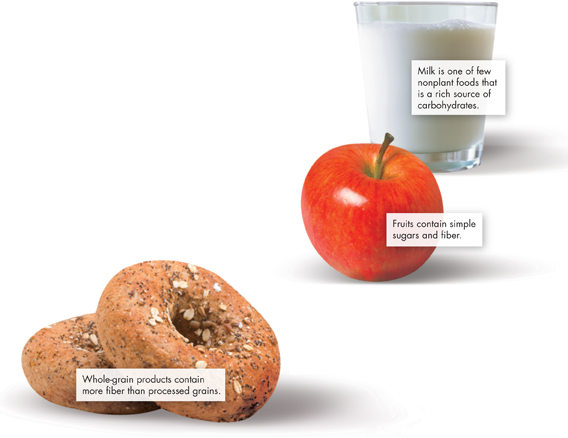Nutrients
 What nutrients does your body need?
What nutrients does your body need?
Nutrients are substances in food that supply the energy and raw materials your body uses for growth, repair, and maintenance.  The nutrients that the body needs include water, carbohydrates, fats, proteins, vitamins, and minerals.
The nutrients that the body needs include water, carbohydrates, fats, proteins, vitamins, and minerals.
Water The most important nutrient is water. Every cell in the human body needs water because many of the body's processes, including chemical reactions, take place in water. Water makes up the bulk of blood, extracellular fluid, and other bodily fluids. On hot days or when you take part in strenuous exercise, sweat glands remove water from your tissues and release it as sweat on the surface of your body. Water is also lost from the body in urine and with every breath you exhale.
Humans need to drink at least 1 liter of fluid each day. If enough water is not taken in to replace what is lost, dehydration can result. Dehydration leads to problems with many body systems, and under extreme conditions it can be fatal.
MYSTERY CLUE

Philip's and Seth's samples were both a very dark yellow. Neither boy drank water before or during practice. Why do you think they were sent home from practice?
Carbohydrates Simple and complex carbohydrates are a major source of energy for the body. Figure 30–5 shows some of the foods that contain carbohydrates. The sugars found in fruits, honey, and sugar cane are simple carbohydrates, or monosaccharides and disaccharides. The starches found in grains, potatoes, and vegetables are complex carbohydrates, or polysaccharides. Starches are broken down by the digestive system into simple sugars. These molecules are absorbed into the blood and carried to cells throughout the body. Excess blood sugar is converted into glycogen, which is stored in the liver and in skeletal muscles. Excess sugar may also be converted to and stored as body fat.
Whole-grain breads, bran, and many fruits and vegetables contain the complex carbohydrate cellulose, often called fiber. Although the human digestive system cannot break down cellulose, you need fiber in your diet. The bulk supplied by fiber helps muscles move food and wastes through your digestive system. Fiber may also have other benefits, such as reducing the risk of heart disease and Type II diabetes.

FIGURE 30–5 Carbohydrates Pastas and cereals are also foods that are rich in carbohydrates. Simple carbohydrates do not have to be digested or broken down. Complex carbohydrates, such as those found in whole grains, must be broken down before they can be used by the body. Infer Which type of carbohydrate—simple or complex—provides the body with quick energy?
dTable of Contents
- Formulas and Equations
- Applying Formulas and Equations
- Mean, Median, and Mode
- Estimation
- Using Measurements in Calculations
- Effects of Measurement Errors
- Accuracy
- Precision
- Comparing Accuracy and Precision
- Significant Figures
- Calculating With Significant Figures
- Scientific Notation
- Calculating With Scientific Notation
- Dimensional Analysis
- Applying Dimensional Analysis




